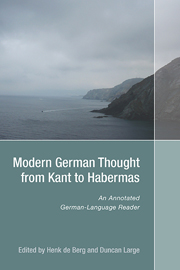43 results
Chapter 6 - The British Centre for Literary Translation
- from Part I - Biographical Aspects
-
-
- Book:
- W. G. Sebald in Context
- Published online:
- 24 August 2023
- Print publication:
- 07 September 2023, pp 50-57
-
- Chapter
- Export citation
13 - Translation and Philosophy
- from Part III - Translation in Company
-
-
- Book:
- The Cambridge Handbook of Translation
- Published online:
- 10 March 2022
- Print publication:
- 17 March 2022, pp 258-276
-
- Chapter
- Export citation
Pokorny's complaint: The insoluble problem of the overwhelming number of false positives generated by suicide risk assessment
-
- Journal:
- BJPsych Bulletin / Volume 41 / Issue 1 / February 2017
- Published online by Cambridge University Press:
- 02 January 2018, pp. 18-20
- Print publication:
- February 2017
-
- Article
-
- You have access
- Open access
- HTML
- Export citation
Acknowledgments
-
- Book:
- Modern German Thought from Kant to Habermas
- Published by:
- Boydell & Brewer
- Published online:
- 05 September 2014
- Print publication:
- 01 October 2012, pp ix-x
-
- Chapter
- Export citation
11 - Max Horkheimer (1895–1973) and Theodor W. Adorno (1903–69)
-
- Book:
- Modern German Thought from Kant to Habermas
- Published by:
- Boydell & Brewer
- Published online:
- 05 September 2014
- Print publication:
- 01 October 2012, pp 317-354
-
- Chapter
- Export citation
4 - Arthur Schopenhauer (1788–1860)
-
- Book:
- Modern German Thought from Kant to Habermas
- Published by:
- Boydell & Brewer
- Published online:
- 05 September 2014
- Print publication:
- 01 October 2012, pp 97-122
-
- Chapter
- Export citation
6 - Friedrich Nietzsche (1844–1900)
-
- Book:
- Modern German Thought from Kant to Habermas
- Published by:
- Boydell & Brewer
- Published online:
- 05 September 2014
- Print publication:
- 01 October 2012, pp 159-184
-
- Chapter
- Export citation
8 - Martin Heidegger (1889–1976)
-
- Book:
- Modern German Thought from Kant to Habermas
- Published by:
- Boydell & Brewer
- Published online:
- 05 September 2014
- Print publication:
- 01 October 2012, pp 217-238
-
- Chapter
- Export citation
Index
-
- Book:
- Modern German Thought from Kant to Habermas
- Published by:
- Boydell & Brewer
- Published online:
- 05 September 2014
- Print publication:
- 01 October 2012, pp 383-396
-
- Chapter
- Export citation
9 - Walter Benjamin (1892–1940)
-
- Book:
- Modern German Thought from Kant to Habermas
- Published by:
- Boydell & Brewer
- Published online:
- 05 September 2014
- Print publication:
- 01 October 2012, pp 239-280
-
- Chapter
- Export citation
Frontmatter
-
- Book:
- Modern German Thought from Kant to Habermas
- Published by:
- Boydell & Brewer
- Published online:
- 05 September 2014
- Print publication:
- 01 October 2012, pp i-iv
-
- Chapter
- Export citation
10 - Georg Lukács (1885–1971)
-
- Book:
- Modern German Thought from Kant to Habermas
- Published by:
- Boydell & Brewer
- Published online:
- 05 September 2014
- Print publication:
- 01 October 2012, pp 281-316
-
- Chapter
- Export citation
5 - Karl Marx (1818–83)
-
- Book:
- Modern German Thought from Kant to Habermas
- Published by:
- Boydell & Brewer
- Published online:
- 05 September 2014
- Print publication:
- 01 October 2012, pp 123-158
-
- Chapter
- Export citation
About the Editors
-
- Book:
- Modern German Thought from Kant to Habermas
- Published by:
- Boydell & Brewer
- Published online:
- 05 September 2014
- Print publication:
- 01 October 2012, pp 397-397
-
- Chapter
- Export citation
Introduction: German Thought since Kant
-
- Book:
- Modern German Thought from Kant to Habermas
- Published by:
- Boydell & Brewer
- Published online:
- 05 September 2014
- Print publication:
- 01 October 2012, pp 1-20
-
- Chapter
- Export citation
Contents
-
- Book:
- Modern German Thought from Kant to Habermas
- Published by:
- Boydell & Brewer
- Published online:
- 05 September 2014
- Print publication:
- 01 October 2012, pp v-viii
-
- Chapter
- Export citation
12 - Jürgen Habermas (b. 1929)
-
- Book:
- Modern German Thought from Kant to Habermas
- Published by:
- Boydell & Brewer
- Published online:
- 05 September 2014
- Print publication:
- 01 October 2012, pp 355-382
-
- Chapter
- Export citation

Modern German Thought from Kant to Habermas
- An Annotated German-Language Reader
-
- Published by:
- Boydell & Brewer
- Published online:
- 05 September 2014
- Print publication:
- 01 October 2012
2 - Georg Wilhelm Friedrich Hegel (1770–1831)
-
- Book:
- Modern German Thought from Kant to Habermas
- Published by:
- Boydell & Brewer
- Published online:
- 05 September 2014
- Print publication:
- 01 October 2012, pp 57-80
-
- Chapter
- Export citation
7 - Sigmund Freud (1856–1939)
-
- Book:
- Modern German Thought from Kant to Habermas
- Published by:
- Boydell & Brewer
- Published online:
- 05 September 2014
- Print publication:
- 01 October 2012, pp 185-216
-
- Chapter
- Export citation



